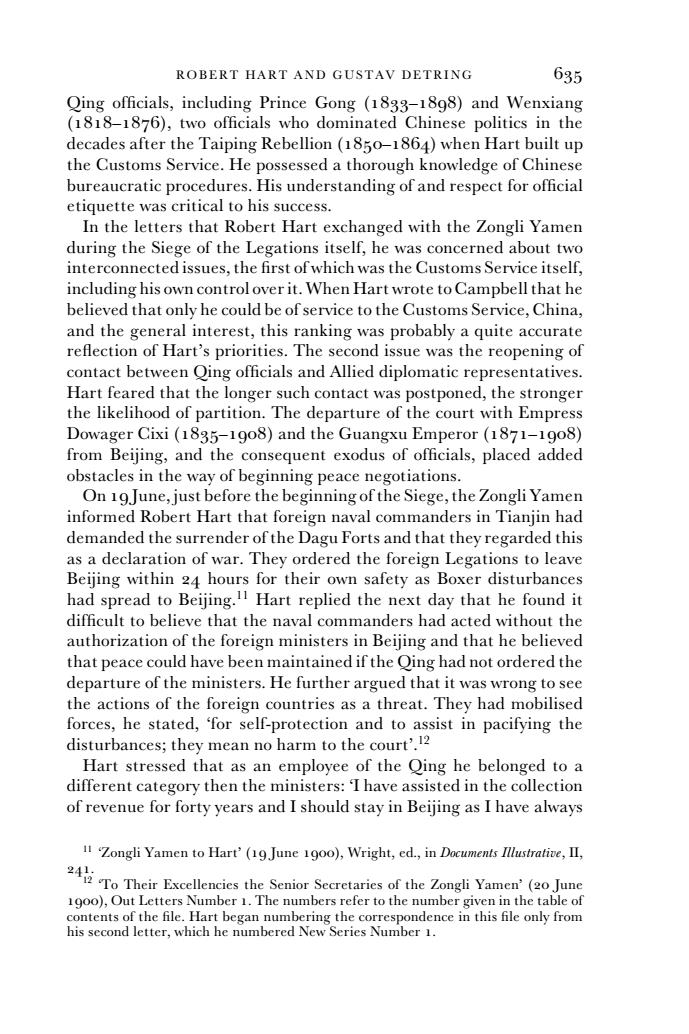正在加载图片...

ROBERT HART AND GUSTAV DETRING 635 Qing officials,including Prince Gong (1833-1898)and Wenxiang (1818-1876),two officials who dominated Chinese politics in the decades after the Taiping Rebellion(1850-1864)when Hart built up the Customs Service.He possessed a thorough knowledge of Chinese bureaucratic procedures.His understanding of and respect for official etiquette was critical to his success. In the letters that Robert Hart exchanged with the Zongli Yamen during the Siege of the Legations itself,he was concerned about two interconnected issues,the first of which was the Customs Service itself, including his own control over it.When Hart wrote to Campbell that he believed that only he could be of service to the Customs Service,China, and the general interest,this ranking was probably a quite accurate reflection of Hart's priorities.The second issue was the reopening of contact between Qing officials and Allied diplomatic representatives. Hart feared that the longer such contact was postponed,the stronger the likelihood of partition.The departure of the court with Empress Dowager Cixi(1835-1908)and the Guangxu Emperor (1871-1908) from Beijing,and the consequent exodus of officials,placed added obstacles in the way of beginning peace negotiations. On 19June,just before the beginning of the Siege,the Zongli Yamen informed Robert Hart that foreign naval commanders in Tianjin had demanded the surrender of the Dagu Forts and that they regarded this as a declaration of war.They ordered the foreign Legations to leave Beijing within 24 hours for their own safety as Boxer disturbances had spread to Beijing.Hart replied the next day that he found it difficult to believe that the naval commanders had acted without the authorization of the foreign ministers in Beijing and that he believed that peace could have been maintained if the Qing had not ordered the departure of the ministers.He further argued that it was wrong to see the actions of the foreign countries as a threat.They had mobilised forces,he stated,'for self-protection and to assist in pacifying the disturbances;they mean no harm to the court'.12 Hart stressed that as an employee of the Qing he belonged to a different category then the ministers:I have assisted in the collection of revenue for forty years and I should stay in Beijing as I have always Zongli Yamen to Hart'(1June 1go0),Wright,ed.,in Documents Illustrative,II, 241. To Their Excellencies the Senior Secretaries of the Zongli Yamen'(20 June 1goo),Out Letters Number 1.The numbers refer to the number given in the table of contents of the file.Hart began numbering the correspondence in this file only from his second letter,which he numbered New Series Number 1.ROBERT HART AND GUSTAV DETRING 635 Qing officials, including Prince Gong (1833–1898) and Wenxiang (1818–1876), two officials who dominated Chinese politics in the decades after the Taiping Rebellion (1850–1864) when Hart built up the Customs Service. He possessed a thorough knowledge of Chinese bureaucratic procedures. His understanding of and respect for official etiquette was critical to his success. In the letters that Robert Hart exchanged with the Zongli Yamen during the Siege of the Legations itself, he was concerned about two interconnected issues, the first of which was the Customs Service itself, including his own control over it. When Hart wrote to Campbell that he believed that only he could be of service to the Customs Service, China, and the general interest, this ranking was probably a quite accurate reflection of Hart’s priorities. The second issue was the reopening of contact between Qing officials and Allied diplomatic representatives. Hart feared that the longer such contact was postponed, the stronger the likelihood of partition. The departure of the court with Empress Dowager Cixi (1835–1908) and the Guangxu Emperor (1871–1908) from Beijing, and the consequent exodus of officials, placed added obstacles in the way of beginning peace negotiations. On 19 June, just before the beginning of the Siege, the Zongli Yamen informed Robert Hart that foreign naval commanders in Tianjin had demanded the surrender of the Dagu Forts and that they regarded this as a declaration of war. They ordered the foreign Legations to leave Beijing within 24 hours for their own safety as Boxer disturbances had spread to Beijing.11 Hart replied the next day that he found it difficult to believe that the naval commanders had acted without the authorization of the foreign ministers in Beijing and that he believed that peace could have been maintained if the Qing had not ordered the departure of the ministers. He further argued that it was wrong to see the actions of the foreign countries as a threat. They had mobilised forces, he stated, ‘for self-protection and to assist in pacifying the disturbances; they mean no harm to the court’.12 Hart stressed that as an employee of the Qing he belonged to a different category then the ministers: ‘I have assisted in the collection of revenue for forty years and I should stay in Beijing as I have always 11 ‘Zongli Yamen to Hart’ (19 June 1900), Wright, ed., in Documents Illustrative, II, 241. 12 ‘To Their Excellencies the Senior Secretaries of the Zongli Yamen’ (20 June 1900), Out Letters Number 1. The numbers refer to the number given in the table of contents of the file. Hart began numbering the correspondence in this file only from his second letter, which he numbered New Series Number 1